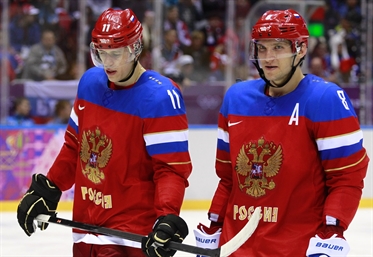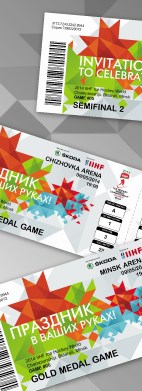Double the fun?
Double the fun?
Ovi + Geno doesn’t always equal world domination

 When Yevgeni Malkin and Alexander Ovechkin have played together on the national team it hasn't always led to the hoped success. Photo: Jeff Vinnick / HHOF-IIHF Images
When Yevgeni Malkin and Alexander Ovechkin have played together on the national team it hasn't always led to the hoped success. Photo: Jeff Vinnick / HHOF-IIHF Images
The Russians are getting precisely that with the addition of superstar Pittsburgh Penguins centre Yevgeni Malkin. And of course, they’ve already got Washington Capitals winger Alexander Ovechkin, the reigning NHL goals leader who has even more individual awards than “Geno”. So far, “Ovi” has been on fire in Minsk, bidding for the World Championship scoring lead with eight points, just one back of fellow countryman Viktor Tikhonov.
But here’s the million-dollar question: will having Ovechkin and Malkin together on the same team enhance Russia’s chances of winning gold?
At first blush, the question seems ridiculous. Since Malkin’s coming was announced, journalists have been constantly asking Russia’s opponents about how they feel about facing a “dream team”. How could bulking up with two intimidating talents possibly be a detriment?
Well, hockey is a team sport. Chemistry is paramount, and these two young Russians haven’t always had it – especially when they’re asked to play on the same line.
In fact, historically, Ovechkin and Malkin have enjoyed very sporadic team success together. Let’s take a quick look back at the 11 IIHF competitions where they’ve worn Russian jerseys side by side. The pair has only won gold once in that span.
2003 IIHF World U18 Championship (Bronze)
Ovechkin runs roughshod over the competition with nine goals and four assists, receiving Best Forward honours and an all-star team berth on home ice in Yaroslavl, Russia. Malkin also fares well with five goals and four assists. But a 2-1 semi-final loss to underdog Slovakia dooms the Russians to the bronze medal game, where they beat the United States 6-3.
2004 IIHF World Junior Championship (Fifth)
The Russians end a sketchy performance in Helsinki, Finland with a 4-3 quarter-final loss to the host nation. Both Ovechkin (5-2-7) and Malkin (1-4-5) have underwhelming tournaments.
2005 IIHF World Junior Championship (Silver)
After an opening 5-4 loss to the host United States in Grand Forks, North Dakota, the Russians get on a roll to the final. Ovechkin (7-4-11) earns himself an all-star berth, and Malkin (3-7-10) offers an effective secondary punch.
But coach Brent Sutter’s powerhouse Canadian team – featuring Sidney Crosby, Ryan Getzlaf, and Corey Perry, among others – trounces Russia 6-1 in the final. Ovechkin does not complete the game due to a shoulder injury.
2005 IIHF World Championship (Bronze)
Ovechkin (5-3-8) is solid while Malkin is quiet (0-4-4) at this tournament in the NHL lockout year in Austria. But like their teammates, they come out flat in a semi-final loss to Canada, allowing their rivals to build a 4-0 lead before mounting a too-little, too-late comeback. Ovechkin scores the 4-3 goal, assisted by Malkin, but that’s as close as Russia gets. The Russians then beat Sweden 6-3 for bronze.
2006 Olympic Games (Fourth)
Ovechkin (5-0-5) takes a more prominent role than Malkin (2-4-6) at the first Olympics for both forwards in Turin, Italy. Ovi enjoys what’s still his greatest Winter Games moment by scoring the winning goal in a 2-0 quarter-final victory that dethrones Canada as champions. However, nary a Russian can light the red lamp thereafter in a 4-0 semi-final loss to Finland and 3-0 bronze medal loss to the Czech Republic.
2006 IIHF World Championship (Fifth)
Apart from a 3-3 round-robin tie with Sweden, the Russians are unstoppable until the playoff round. But this final hurrah under coach Vladimir Krikunov in Riga, Latvia comes to a sad end when Czech forward Zbynek Irgl scores the 4-3 overtime winner with a neat bit of stickhandling in the quarter-finals. Ovechkin (6-3-9) is, somewhat surprisingly, voted to the tournament all-star team, while Malkin (3-6-9) is not.
2007 IIHF World Championship (Bronze)
This marks the turning point when Malkin begins to outshine Ovechkin in most cases in IIHF competition. Coming off a slightly disappointing sophomore season with Washington (i.e. 46 goals), Ovechkin can’t find his game under new coach Slava Bykov on home ice in Moscow (1-2-3). Malkin is much more dominant (5-5-10).
But it all goes sour when Mikko Koivu’s 2-1 semi-final overtime winner for Finland ends Russia’s quest for gold on home ice – the first time Russia has ever lost a World Championship game in its capital. The Russians settle for bronze with a 3-1 win over Sweden.
2010 Olympic Games (Sixth)
Ovechkin is obsessed with beating host Canada in Vancouver, but his biggest moment turns out to be hitting Jaromir Jagr at centre ice in a round-robin win over the Czechs. Malkin (3-3-6) is a little better than Ovechkin (2-2-4), but their line with Alexander Syomin is checked into the ice by Rick Nash, Jonathan Toews, and Mike Richards in a disastrous 7-3 quarter-final loss.
2010 IIHF World Championship (Silver)
Fourteen members of the 2010 Russian Olympic team make good on a vow to come to the Worlds if available and seek redemption after their Vancouver failure. Similar to the 2014 World Championship team’s progress so far in Minsk, the Russians assemble a perfect record through the round-robin.
After beating Canada 5-2 in the quarter-finals and host Germany 2-1 in the semi-finals, they are heavily favoured to knock off a less-than-star-studded Czech team in the gold medal game, but instead fall 2-1. Malkin, a late addition (5-2-7), is much more of a presence, along with Pavel Datsyuk, than Ovechkin (5-1-6 in nine games).
2012 IIHF World Championship (Gold)
If you look up “domination” in the dictionary, you might find a photo of Malkin leading Russia to a perfect 10-0 record at this tournament in Stockholm and Helsinki – the first time such a record had been achieved since the Soviet Union in 1989.
“Geno” becomes the first player to win both the NHL and World Championship scoring title (11-8-19) in the same year since Wayne Gretzky in 1982. Ovechkin is quite serviceable (2-2-4) as a post-playoff addition, but the lion’s share of credit deservedly goes to the super centre from Magnitogorsk.
2014 Olympic Games (Fifth)
Hockey historians will long debate whether Russia’s failure to win in Vancouver or in Sochi was more disappointing. Coach Zinetula Bilyaletdinov repeats Bykov’s mistake of playing Ovechkin and Malkin on the same line, and while both want the puck, neither is able to do much with it.
Ovechkin (1-1-2) records both his points in the 5-2 opening win versus Slovenia, and Malkin has all of his points (1-2-3) in that same less-than-crucial matchup. They are overshadowed by Datsyuk as well as KHLers Ilya Kovalchuk and Alexander Radulov in group play.
And they are as silent as a winter night in northern Siberia in the 3-1 quarter-final loss to Finland that ends the $50-billion dream of men’s hockey gold in the Motherland.
Back to Overview

















































































